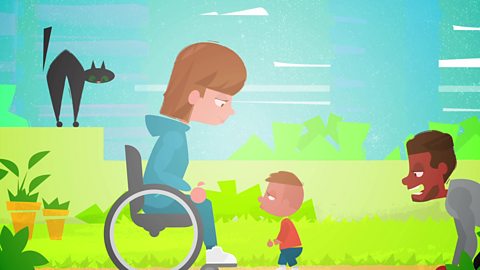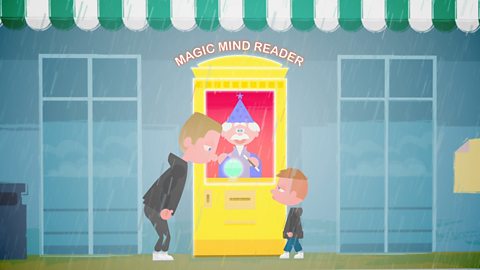Has your child turned into a little detective, asking you question after question after question?
One study found that on average, children aged between 14 months and 5 years asked 107 questions an hour!
And often the number of questions that children ask rockets up as they discover the power of one small word that can help them make sense of the world: ‚Äòw≥Û≤‚?‚Äô
The more they ask ‚Äòw≥Û≤‚?‚Äô questions, the more adults tell them about the things they‚Äôre interested in. So, you may find that in answering ‚Äòw≥Û≤‚?‚Äô questions, you‚Äôre faced with more and more of them - 'why?.. why?.. why?..'
To find out more about why children ask so many ‚Äòw≥Û≤‚?‚Äô questions, we spoke to clinical psychologist Linda Blair.
Why Daddy? Why Daddy? Why? Has your child turned into a little detective, constantly questioning you and driving you just a tiny bit round the bend? Well, it‚Äôs perfectly normal. At around three to four years old, your child becomes a very curious little person, desperate to know the reason for just about everything.¬ÝThey‚Äôre fascinated by the world and they‚Äôve discovered how to make adults to tell them about it. It‚Äôs just that one simple little word: Why!
In a study, researchers recorded children interacting with their parents and showed they asked an average of 107 questions an hour! But the good news is, all these questions are actually brilliant for their language learning. It’s an opportunity to hear new words and practice their social skills. Questions are also a great way for your little one to solve problems and learn about the world. In another study, researchers gave 4-5 year olds a puzzle to solve and found that 91% of their questions were focused towards solving that puzzle.
So, if you want to help your child’s language learning, all you have to do is answer their questions! It’s not as easy as it sounds. Some questions are harder than others! But don’t worry, just responding to your child helps them practice conversation and engages their imagination.constantly questioning.
Why do children ask ‚Äòw≥Û≤‚?‚Äô questions?
According to Linda, children begin asking ‚Äòw≥Û≤‚?‚Äô questions as their brains develop and they discover more and more about the world around them.
“At around 2 and a half all sorts of connections are being made in your child’s brain, in particular the connections about how things are grouped together, as well as how one thing happening leads to another thing happening,” she says.
Once they begin to understand how things they see are related to one another, they have a thirst for more of this knowledge. They soon realise this can be met by asking questions to the adults around them, and parents often start to get a barrage of ‚Äòw≥Û≤‚?‚Äô questions between the ages of 3 and 4. ‚ÄúAs they become more aware and more confident, they explore more. Then there are more questions to be asked - almost faster than they can take it in.‚Äù
It's uncertainty in how things are connected that leads to ‚Äòw≥Û≤‚?‚Äô questions, says Linda. ‚ÄúThey ask ‚Äòw≥Û≤‚?‚Äô because they don't understand how something has suddenly appeared, or how that thing there looks different than the one over here. For example, they think that dogs have short hair because their dog has short hair, but then they see one with long curly hair.‚Äù
Having adults answer their ‚Äòw≥Û≤‚?‚Äô questions helps children to feel safe and secure in their world.

There are two reasons for this, says Linda. “Firstly, they want you to clarify and explain things to them so that they can make predictions about the world and what will happen within it. Just like adults, children are most afraid when they’re not sure what is going to happen.”
The other reason is that it allows them to share with you something they’re excited by and interested in, making them feel important and loved. “By sharing an interest with you, they feel valued, and that also grows their self-esteem.”
We used to think kids were asking questions simply to get attention. I don’t think so. Most studies suggest that they actually want the information and that they also want you to know that they’re interested in something.
“That’s different than just asking for your attention. They’re asking to share what they’re loving with you.”
Once you and your child are sharing a focus on something that interests them and talking about it, they’re much more likely to be engaged and listen to the words you’re saying, as they’re actively looking to learn.
“As a parent you really have an opportunity at that point. When they don’t have any language, it really is hard to guess what it is they want to know about. But you have a strong tool now to make them excited about learning and discovery.”

How to respond to children's questions

One clever way of responding to a ‚Äòw≥Û≤‚?‚Äô question, is to turn the question back on to your child, says Linda, by asking them in return ‚Äòwhat do you think?‚Äô.
Their response can give you a better idea of what they really want to know. Take as an example, your child asking ‘why is it raining?’. “They may want to know why it’s raining for reasons that you couldn’t dream of. And we often answer from our view before we find out what theirs is,” says Linda.
By asking them questions in return, you can find out what their level of understanding is and work out what information they really want. “Maybe what they really want to know isn’t the literal reason why it’s raining. Maybe it’s what they should wear when it’s raining? Or if they are allowed to run around in the rain?”
The quicker you find out what they really want to know and can provide an answer, the quicker you’ll put an end to the endless chain of ‘Why?’ questions too. “The reason they keep asking more questions is often because you haven’t figured out what it is they really want to know. Once they know it, they’ll probably stop. So just keep asking them back in a nice way.”
Another advantage to this approach is that you’re encouraging them to be curious and imaginative about the world around them. “By asking ‘why do you think?’ back to them, you’re developing their imagination. You’re also giving them self-confidence through praise when you say, ‘I never thought of that, that’s a great idea’, before you say ‘here’s what I think…’”
“They’re learning the thing that every scientist must know, which is that there isn’t one answer. There’s a number of possible answers and they must decide which one is best.”
But what if you ask them what they think, and you’re met with a response of ‘I don’t know’ or they just aren’t able to give an answer? In this case, Linda suggests that you make a best guess at what they want to understand better and explain it to them as best you can.
They might ask more ‚Äòw≥Û≤‚?‚Äô questions, which will hopefully help you to narrow down exactly what it is they're hoping to understand. The more you talk to them, the more likely they‚Äôll build their vocabulary and be better able to express themselves in future.

What do I do if I can't answer my child's questions?
Linda is keen to stress that it’s ok not to know the answers to everything your child asks you.
One of the biggest gifts you can give your kid is to engage with them in a joint search for knowledge.
“Say to them things like, ‘actually, I don't know why there are so many stars in the sky. But shall we find out together?’. You're demonstrating that nobody knows everything and acting as a role model by starting to find out with them. You also give them one of the greatest gifts that you can: encouragement to keep on learning throughout their lifetime.”






